- Home
- Brandon Sanderson
Legion: Skin Deep
Legion: Skin Deep Read online
Legion
Skin Deep
Brandon Sanderson
For Greg Creer,
Who was the first person other than myself to ever read one of my books. Thank you for the encouragement, my friend!
Part One
1
“What’s her angle?” Ivy asked, walking around the table with her arms folded. Today, she wore her blonde hair in a severe bun, which was stuck through with several dangerous-looking pins.
I tried, unsuccessfully, to ignore her.
“Gold digger, perhaps?” Tobias asked. Dark-skinned and stately, he had pulled a chair over to the table so he could sit beside me. He wore his usual relaxed suit with no tie, and fit in well with this room of crystalline lighting and piano music. “Many a woman has seen only Stephen’s wealth, and not his acumen.”
“She’s the daughter of a real estate magnate,” Ivy said with a dismissive wave. “She has wealth coming out of her nose.” Ivy leaned down beside the table, inspecting my dinner companion. “A nose, by the way, which seems to have had as much work done on it as her chest.”
I forced out a smile, trying to keep my attention on my dinner companion. I was used to Ivy and Tobias by now. I relied upon them.
But it can be damn hard to enjoy a date when your hallucinations are along.
“So . . .” said Sylvia, my date. “Malcom tells me you’re some kind of detective?” She gave me a timid smile. Resplendent in diamonds and a tight black dress, Sylvia was an acquaintance of a mutual friend who worried about me far too much. I wondered how much research Sylvia had done on me before agreeing to the blind date.
“A detective?” I said. “Yes, I suppose you could say that.”
“I just did!” Sylvia replied with a chittering laugh.
Ivy rolled her eyes, refusing the seat Tobias pulled over for her.
“Though honestly,” I said to Sylvia, “the word ‘detective’ probably gives you the wrong idea. I just help people with very specialized problems.”
“Like Batman!” Sylvia said.
Tobias spat out his lemonade in a spray before him. It spotted the tablecloth, though Sylvia—of course—couldn’t see it.
“Not . . . really like that,” I said.
“I was just being silly,” Sylvia said, taking another drink of her wine. She’d had a lot of that for a meal that she’d only just begun. “What kind of problems do you solve? Like, computer problems? Security problems? Logic problems?”
“Yes. All three of those, and then some.”
“That . . . doesn’t sound very specialized to me,” Sylvia said.
She had a point. “It’s difficult to explain. I’m a specialist, just in lots of areas.”
“Like what?”
“Anything. Depends on the problem.”
“She’s hiding things,” Ivy said, arms still folded. “I’m telling you, Steve. She’s got an angle.”
“Everyone does,” I replied.
“What?” Sylvia asked, frowning as a server with a cloth over her arm made our salad plates vanish.
“Nothing,” I said.
Sylvia shifted in her chair, then took another drink. “You were talking to them, weren’t you?”
“So you have read up on me.”
“A girl has to be careful, you know. There are some real psychos in the world.”
“I assure you,” I said. “It’s all under control. I see things, but I’m completely aware of what is real and what is not.”
“Be careful, Stephen,” Tobias said from my side. “This is dangerous territory for a first date. Perhaps a discussion of the architecture instead?”
I realized I’d been tapping my fork against my bread plate, and stopped.
“This building is a Renton McKay design,” Tobias continued in his calm, reassuring way. “Note the open nature of the room, with the movable fixtures, and geometric designs in ascending patterns. They can rebuild the interior every year or so, creating a restaurant that is half eatery, half art installation.”
“My psychology really isn’t that interesting,” I said. “Not like this building. Did you know that it was built by Renton McKay? He—”
“So you see things,” Sylvia interrupted. “Like visions?”
I sighed. “Nothing so grand. I see people who aren’t there.”
“Like that guy,” she said. “In that movie.”
“Sure. Like that. Only he was crazy, and I’m not.”
“Oh, yeah,” Ivy said. “What a great way to put her at ease. Explain in depth how not crazy you are.”
“Aren’t you supposed to be a therapist?” I snapped back at her. “Less sarcasm would be delightful.”
That was a tall order for Ivy. Sarcasm was kind of her native tongue, though she was fluent in “stern disappointment” and “light condescension” as well. She was also a good friend. Well, imaginary friend.
She just had a thing about me and women. Ever since Sandra abandoned us, at least.
Sylvia regarded me with a stiff posture, and only then did I realize I’d spoken out loud to Ivy. As Sylvia noticed me looking at her, she plastered on a smile as fake as red dye #6. Inside, I winced. She was quite attractive, despite what Ivy claimed—and no matter how crowded my life had become, it also got terribly lonely.
“So . . .” Sylvia said, then trailed off. Entrées arrived. She had chic lettuce wraps. I’d chosen a safe-sounding chicken dish. “So, uh . . . You were speaking to one of them, just now? An imaginary person?” She obviously considered it polite to ask. Perhaps the proper lady’s book of etiquette had a chapter on how to make small talk about a man’s psychological disabilities.
“Yes,” I said. “That was one of them. Ivy.”
“A . . . lady?”
“A woman,” I said. “She’s only occasionally a lady.”
Ivy snorted. “Your maturity is stunning, Steve.”
“How many of your personalities are female?” Sylvia asked. She hadn’t touched her food yet.
“They aren’t personalities,” I said. “They’re separate from me. I don’t have dissociative identity disorder. If anything, I’m schizophrenic.”
That is a subject of some debate among psychologists. Despite my hallucinations, I don’t fit the profile for schizophrenia. I don’t fit any of the profiles. But why should that matter? I get along just fine. Mostly.
I smiled at Sylvia, who still hadn’t started her food. “It’s not a big deal. My aspects are probably just an effect of a lonely childhood, spent mostly by myself.”
“Good,” Tobias said. “Now transition the conversation away from your eccentricities and start talking about her.”
“Yes,” Ivy said. “Find out what she’s hiding.”
“Do you have siblings?” I asked.
Sylvia hesitated, then finally picked up her silverware. Never had I been so happy to see a fork move. “Two sisters,” she said, “both older. Maria is a consultant for a marketing firm. Georgia lives in the Cayman Islands. She’s an attorney . . .”
I relaxed as she continued. Tobias raised his glass of lemonade to me in congratulations. Disaster avoided.
“You’re going to have to talk about it with her eventually,” Ivy said. “We aren’t exactly something she can ignore.”
“Yes,” I said softly. “But for now, I’ll settle for surviving the first date.”
“What was that?” Sylvia looked at us, hesitating in her narrative.
“Nothing,” I said.
“She was speaking about her father,” Tobias said. “A banker. Retired.”
“How long was he in banking?” I asked, glad that one of us had been paying attention.
“Forty-eight years! We kept saying he didn’t need to continue on . . .”
I smiled and began cutting my chicken as she talked.
“Perimeter clear,” a voice said from behind me.
I started, looking over my shoulder. J.C. stood there, wearing a busboy’s uniform and carrying a tray of dirty dishes. Lean, tough, and square-jawed, J.C. is a cold-blooded killer. Or so he claims. I think it means he likes to murder amphibians.
He was a hallucination, of course. J.C., the plates he was carrying, the handgun he had holstered inconspicuously under his white server’s jacket . . . all hallucinations. Despite that, he’d saved my life several times.
That didn’t mean I was pleased to see him.
“What are you doing here?” I hissed.
“Watching out for assassins,” J.C. said.
“I’m on a date!”
“Which means you’ll be distracted,” J.C. said. “Perfect time for an assassination.”
“I told you to stay home!”
“Yeah, I know. The assassins would have heard that too. That’s why I had to come.” He nudged me with an elbow. I felt it. He might be imaginary, but he felt perfectly real to me. “She’s a looker, Skinny. Nice work!”
“Half of her is plastic,” Ivy said dryly.
“Same goes for my car,” J.C. said. “It still looks nice.” He grinned at Ivy, then leaned down to me. “I don’t suppose you could . . .” He nodded toward Ivy, then raised his hands to his chest, making a cupping motion.
“J.C.,” Ivy said flatly. “Did you just try to get Steve to imagine me with a larger chest?”
J.C. shrugged.
“You,” she said, “are the most loathsome non-being on the planet. Really. You should feel proud. Nobody has imagined anything more slimy, ever.”
The two of them had an off-again on-again relationship. Apparently, “off-again” had started when I wasn’t looking. I really had no idea what to make of it—this was the first time two of my aspects had become romantically entangled.
Curiously, J.C. had been completely unable to say the words about me imagining Ivy with a different body shape. He didn’t like to confront the fact that he was a hallucination. It made him uncomfortable.
J.C. continued looking the room over. Despite his obvious hangups, he was keen-eyed and very good with security. He’d notice things I would not, so perhaps it was good he’d decided to join us.
“What?” I asked him. “Is there something wrong?”
“He’s just paranoid,” Ivy said. “Remember when he thought the postman was a terrorist?”
J.C. stopped scanning, his attention focusing sharply on a woman sitting three tables over. Dark-skinned and wearing a nice pantsuit, she turned toward her window as soon as I noticed her. That window reflected back our way, and it was dark outside. She could still be watching.
“I’ll check it out,” J.C. said, moving away from our table.
“Stephen . . .” Tobias said.
I glanced back at our table and found Sylvia staring at me again, her fork held loosely as if forgotten, her eyes wide.
I forced myself to chuckle. “Sorry! Got distracted by something.”
“By what?”
“Nothing. You were saying something about your mother—”
“What distracted you?”
“An aspect,” I said, reluctant.
“A hallucination, you mean.”
“Yes. I left him home. He came on his own.”
Sylvia stared intently at her food. “That’s interesting. Tell me more.”
Being polite again. I leaned forward. “It’s not what you think, Sylvia. My aspects are just pieces of me, receptacles for my knowledge. Like . . . memories that get up and walk around.”
“She’s not buying it,” Ivy noted. “Breathing quickly. Fingers tense . . . Steve, she knows more about you than you think. She’s not acting shocked, but instead like she’s been set up on a date with Jack the Ripper and is trying to keep her cool.”
I nodded at the information. “It’s nothing to worry about.” Had I said that already? “Each of my aspects help me in some way. Ivy is a psychologist. Tobias is a historian. They—”
“What about the one that just arrived?” Sylvia asked, looking up and meeting my eyes. “The one who came when you weren’t expecting?”
“Lie,” Tobias said.
“Lie,” Ivy said. “Tell her he’s a ballet dancer or something.”
“J.C.,” I said instead, “is ex-Navy SEAL. He helps me with that sort of thing.”
“That sort of thing?”
“Security situations. Covert operations. Any time I might be in danger.”
“Does he tell you to kill people?”
“It’s not like that. Okay, well, it is kind of like that. But he’s usually joking.”
Ivy groaned.
Sylvia stood up. “Excuse me. I need the restroom.”
“Of course.”
Sylvia took her purse and shawl and left.
“Not coming back?” I asked Ivy.
“Are you kidding? You just told her that an invisible man who tells you to kill people just showed up when you didn’t want him to.”
“Not one of our smoothest interactions,” Tobias agreed.
Ivy sighed and sat down in Sylvia’s seat. “Better than last time, at least. She lasted . . . what? Half an hour?”
“Twenty minutes,” Tobias said, glancing at the restaurant’s grandfather clock.
“We’re going to need to get over this,” I whispered. “We can’t keep going to pieces every time romance is potentially involved.”
“You didn’t need to say what you did about J.C.,” Ivy said. “You could have made something up. Instead, you told her the truth. The frightening, embarrassing, J.C.-filled truth.”
I picked up my drink. Lemonade in a fancy wine glass. I turned it about. “My life is fake, Ivy. Fake friends. Fake conversations. Often, on Wilson’s day off, I don’t speak to a single real person. I guess I don’t want to start a relationship with lies.”
The three of us sat in silence until J.C. came jogging back, dancing to the side of a real server as they passed one another.
“What?” he asked, glancing at Ivy. “You chased the chick off already?”
I raised my glass to him.
“Don’t be too hard on yourself, Stephen,” Tobias said, resting his hand on my shoulder. “Sandra is a difficult woman to forget, but the scars will eventually heal.”
“Scars don’t heal, Tobias,” I said. “That’s kind of the definition of the word scar.” I turned my glass around, looking at the light on the ice.
“Yeah, great, whatever,” J.C. said. “Emotions and metaphors and stuff. Look, we’ve got a problem.”
I looked at him.
“The woman we saw earlier?” J.C. said, pointing. “She—” He cut off. The woman’s seat was empty, her meal left half-eaten.
“Time to go?” I asked.
“Yeah,” J.C. said. “Now.”
2
“Zen Rigby,” J.C. said as we rushed from the restaurant. “Private security—and, in this case, those are fancy words for ‘killer on retainer.’ She has a list of suspected hits as long as your psychological profile, Skinny. No proof. She’s good.”
“Wait,” Ivy said from my other side. “You’re saying that an assassin really did show up at dinner?”
“Apparently,” I replied. J.C. could only know what I did, so if he was saying these things, they were dredged from deep in my memory. I periodically looked over lists of operatives, spies, and professional assassins for missions I did.
“Great,” Ivy said, not looking at J.C. “He’s going to be insufferable to live with now.”
On the way out of the restaurant, at J.C.’s prompting, I looked at the reservation list. That simple glance dumped the information there into my mind, and gave the aspects access to it.
“Carol Westminster,” J.C. said, picking a name off the list. “She’s used that alias before. It was Zen for sure.”
We stopped at the valet stand outside
, the rainy evening making cars swish as they drove past on the wet road. The weather dampened the city’s normal pungency—so instead of unwashed hobo, it smelled like recently washed hobo. A man asked for our valet ticket, but I ignored him, texting Wilson to bring our car.
“You said she’s on retainer, J.C.,” I said as I texted. “Whom does she work for?”
“Not sure,” J.C. said. “Last I heard, she was looking for a new home. Zen isn’t one of those ‘hire for a random hit’ assassins. Companies bring her on and keep her long term, use her to clean up messes, fix problems in legally ambiguous ways.”
I knew all of this, deep down, but J.C. had to tell it to me. I’m not crazy, I’m compartmentalized. Unfortunately, my aspects . . . well, they tend to be a little unhinged. Tobias stood to the side, muttering that Stan—the voice he hears sometimes—hadn’t warned him of the rain. Ivy pointedly did not look at the series of small wormholes in the post nearby. Had it always been this bad?
“It could just be a coincidence,” Tobias said to me, shaking his head and turning away from his inspection of the sky. “Assassins go out for dinner like everyone else.”
“I suppose,” J.C. said. “If it is a coincidence, though, I’m gonna be annoyed.”
“Looking forward to shooting someone tonight?” Ivy asked.
“Well, yeah, obviously. But that’s not it. I hate coincidences. Life is much simpler when you can just assume that everyone is trying to kill you.”
Wilson texted back. Old friend called. Wanted to speak with you. He is in car. Okay?
I texted back. Who?
Yol Chay.
I frowned. Yol? Was the assassin his? Fine, I texted.
A few minutes out, Wilson texted to me.
“Yo,” J.C. said, pointing. “Scope it.”
Nearby, Sylvia was getting into a car with a man in a suit. Glen, reporter for the Mag. He shut the door for Sylvia, glanced at me and shrugged, tipping his antiquated fedora before climbing in the other side of the car.
“I knew she had an angle!” Ivy aid. “It was a setup! I’ll bet she was recording the entire date.”
I groaned. The Mag was a tabloid of the worst kind—meaning that it published enough truths mixed with its fabrications that people kind of trusted it. For most of my life I’d avoided mainstream media attention, but recently the papers and news websites had latched on to me.

 Steelheart
Steelheart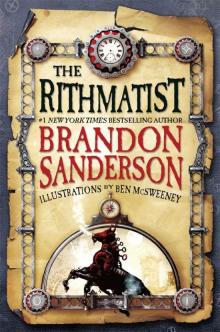 The Rithmatist
The Rithmatist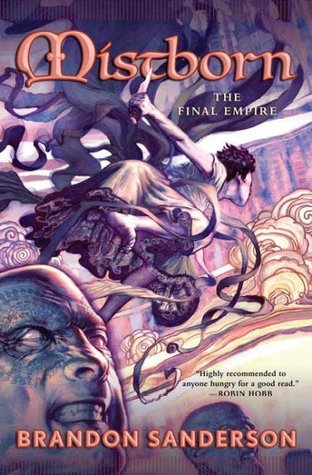 Mistborn: The Final Empire
Mistborn: The Final Empire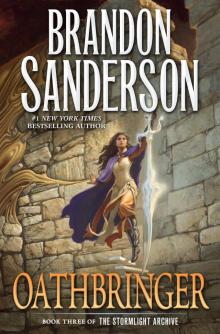 Oathbringer
Oathbringer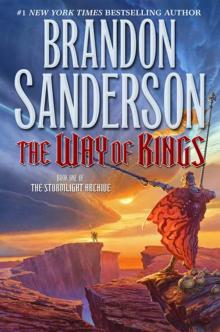 The Way of Kings
The Way of Kings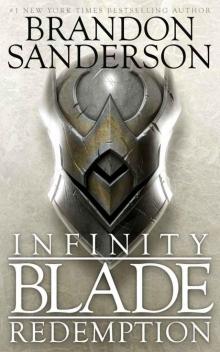 Redemption
Redemption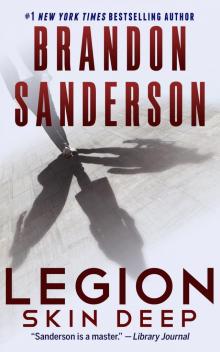 Skin Deep
Skin Deep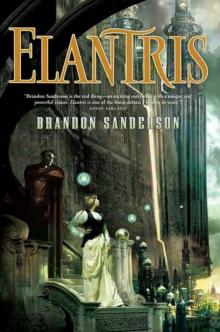 Elantris
Elantris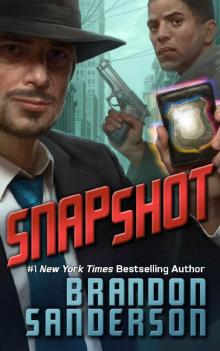 Snapshot
Snapshot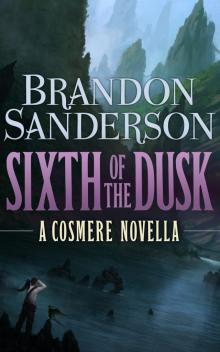 Sixth of the Dusk (Cosmere)
Sixth of the Dusk (Cosmere)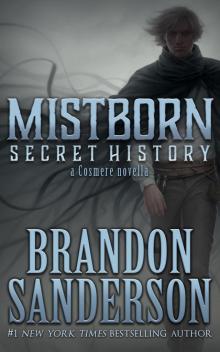 Mistborn: Secret History
Mistborn: Secret History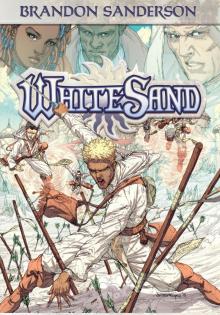 White Sand, Volume 1
White Sand, Volume 1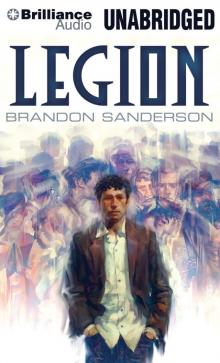 Legion
Legion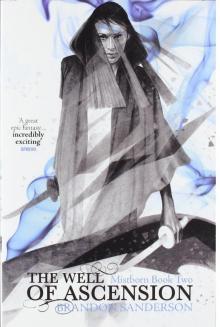 The Well of Ascension
The Well of Ascension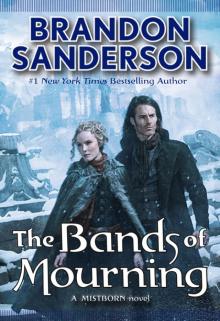 The Bands of Mourning
The Bands of Mourning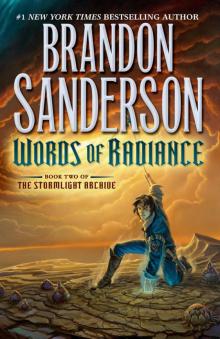 Words of Radiance
Words of Radiance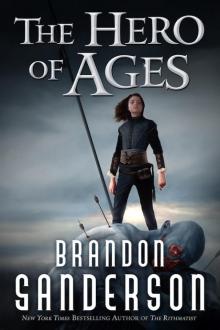 The Hero of Ages
The Hero of Ages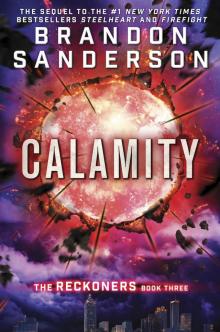 Calamity
Calamity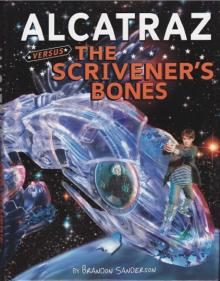 Alcatraz Versus the Scrivener's Bones
Alcatraz Versus the Scrivener's Bones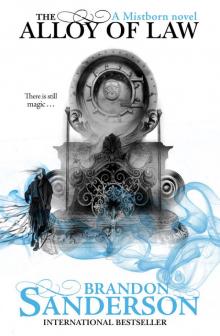 The Alloy of Law
The Alloy of Law The Emperors Soul
The Emperors Soul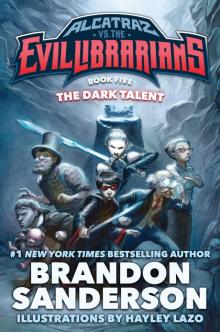 The Dark Talent
The Dark Talent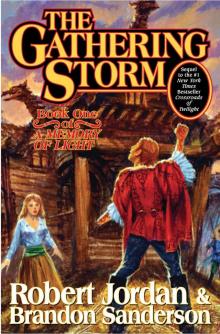 The Gathering Storm
The Gathering Storm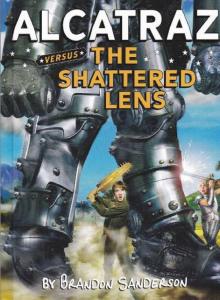 Alcatraz Versus the Shattered Lens
Alcatraz Versus the Shattered Lens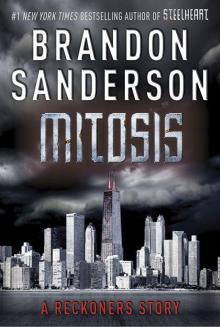 Mitosis
Mitosis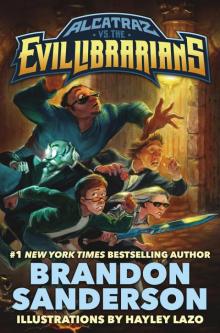 Alcatraz vs. The Evil Librarians
Alcatraz vs. The Evil Librarians Rhythm of War (9781429952040)
Rhythm of War (9781429952040)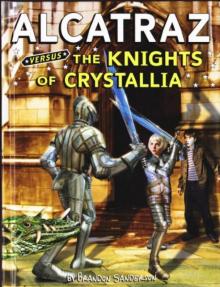 Alcatraz Versus the Knights of Crystallia
Alcatraz Versus the Knights of Crystallia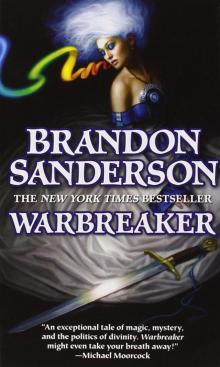 Warbreaker
Warbreaker Firstborn
Firstborn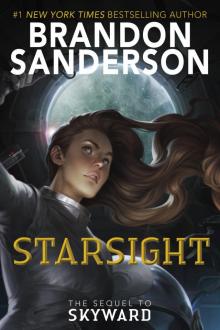 Starsight
Starsight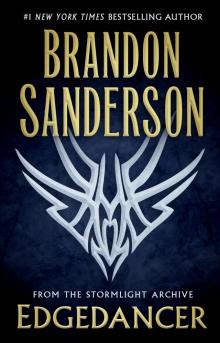 Edgedancer
Edgedancer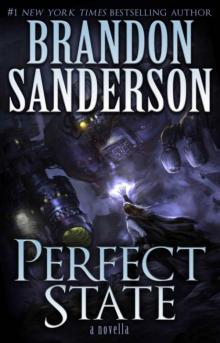 Perfect State
Perfect State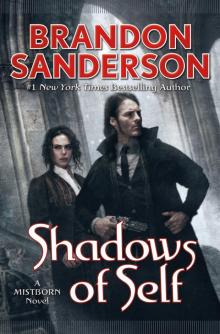 Shadows of Self
Shadows of Self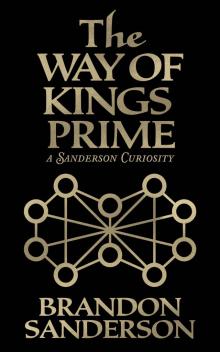 The Way of Kings Prime
The Way of Kings Prime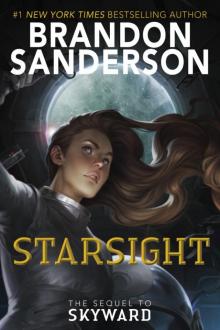 Starsight (US)
Starsight (US)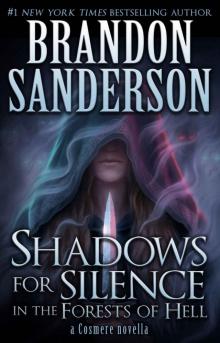 Shadows for Silence in the Forests of Hell
Shadows for Silence in the Forests of Hell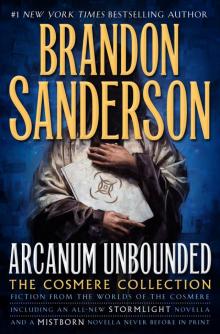 Arcanum Unbounded: The Cosmere Collection
Arcanum Unbounded: The Cosmere Collection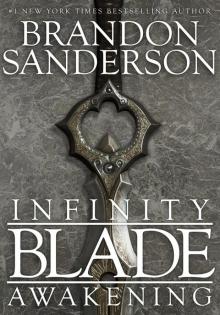 Awakening
Awakening Firefight
Firefight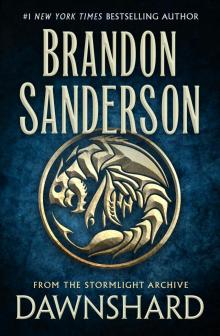 Dawnshard
Dawnshard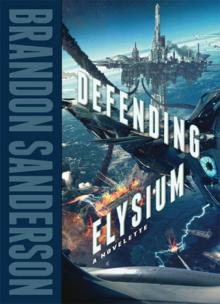 Defending Elysium
Defending Elysium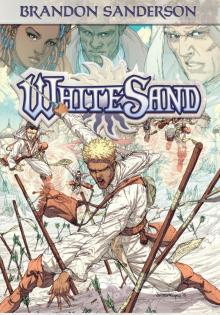 White Sand
White Sand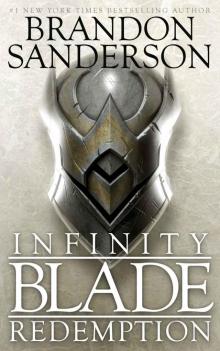 Infinity Blade: Redemption
Infinity Blade: Redemption The Final Empire
The Final Empire Skyward
Skyward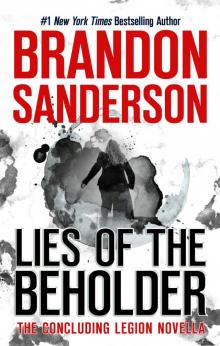 Lies of the Beholder
Lies of the Beholder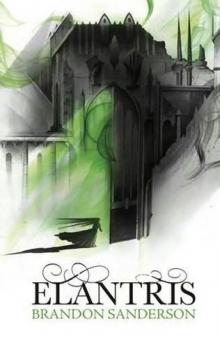 Elantris e-1
Elantris e-1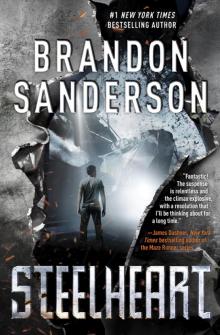 Steelheart r-1
Steelheart r-1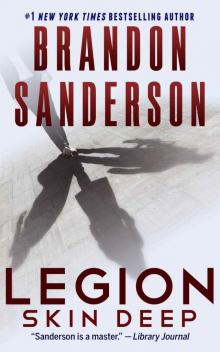 Legion: Skin Deep
Legion: Skin Deep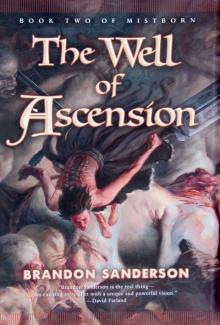 Well of Ascension
Well of Ascension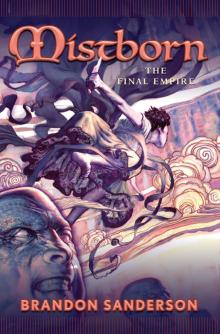 Mistborn
Mistborn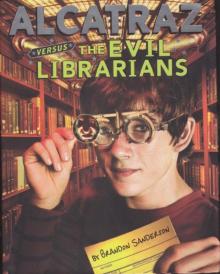 Alcatraz versus the Evil Librarians
Alcatraz versus the Evil Librarians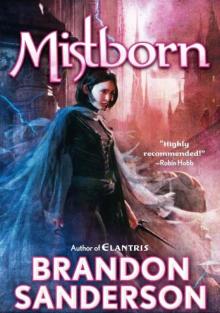 The Final Empire m-1
The Final Empire m-1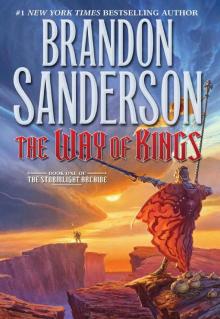 The Way of Kings (Stormlight Archive, The)
The Way of Kings (Stormlight Archive, The)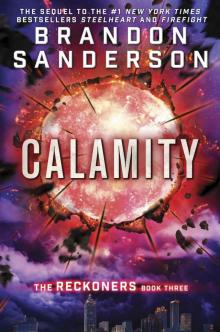 Calamity (The Reckoners)
Calamity (The Reckoners)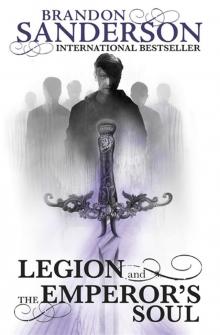 Legion and the Emperor's Soul
Legion and the Emperor's Soul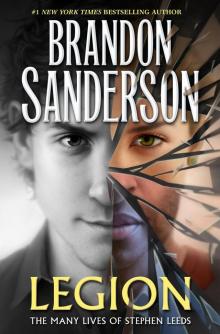 Legion: The Many Lives of Stephen Leeds
Legion: The Many Lives of Stephen Leeds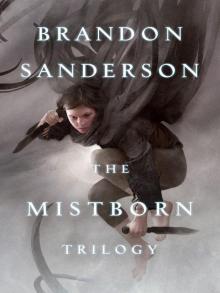 The Mistborn Trilogy
The Mistborn Trilogy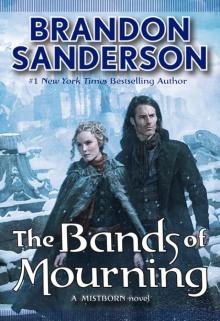 Bands of Mourning
Bands of Mourning Alcatraz
Alcatraz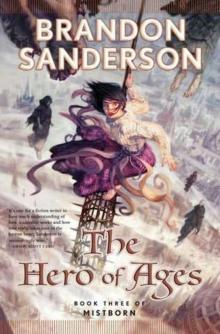 The Hero of Ages m-3
The Hero of Ages m-3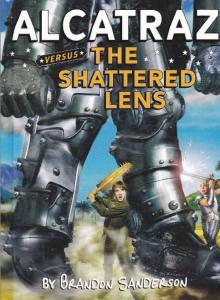 Alcatraz vs. the Shattered Lens
Alcatraz vs. the Shattered Lens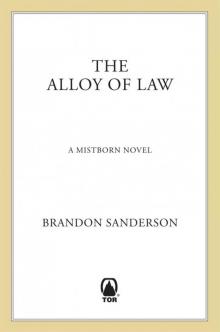 The Alloy of Law: A Mistborn Novel
The Alloy of Law: A Mistborn Novel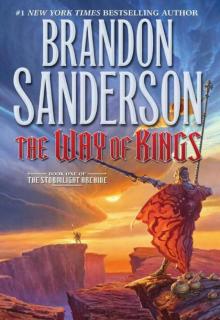 The Way of Kings sa-1
The Way of Kings sa-1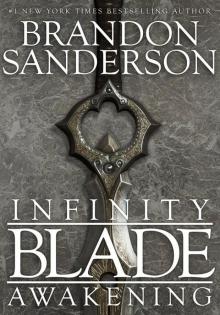 Infinity Blade: Awakening
Infinity Blade: Awakening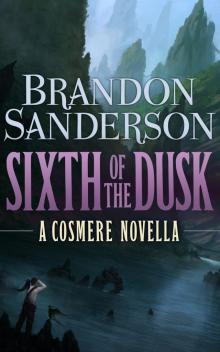 Sixth of the Dusk
Sixth of the Dusk The Stormlight Archive
The Stormlight Archive The Aether of Night
The Aether of Night